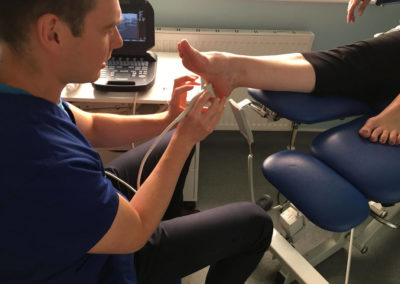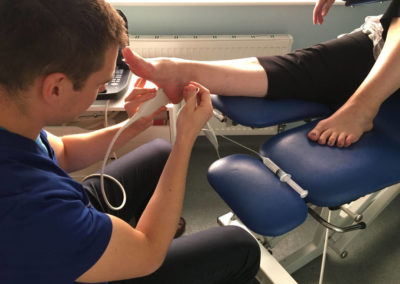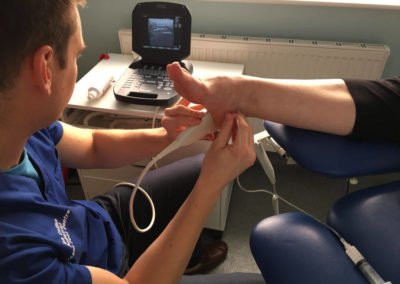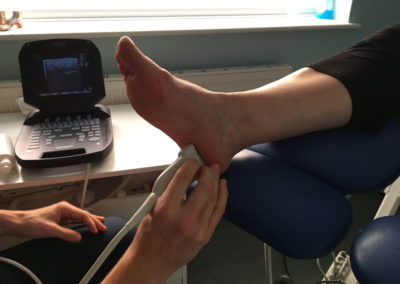Plantar Fasciitis
No two people are the same, much in the same way that no two pairs of feet are the same, so when treatment is selected for plantar fasciitis it is directed to the individual’s needs and at the Sussex Foot Centre we make every treatment bespoke to the individual.
Plantar Fasciitis (Chronic Plantar Heel Pain) is one of the main conditions we treat at the Sussex Foot Centre. The Plantar Fascia is a broad, thick band of tissue that runs from under the heel to the front of the foot. There are three bands of the plantar fascia, the middle large part and one on either side of the sole of the foot, it is the most superficial layer of the foot. Under normal circumstances, your plantar fascia acts like a shock-absorbing bowstring which supports the arch of your foot. If the tension on that bowstring becomes too great, it can create small tears in the fascia. Repetitive stretching and tearing can cause the fascia to become irritated or inflamed. Through overuse, the fascia can become inflamed and painful at its attachment to the heel bone or calcaneus. Although the condition was traditionally thought to be an inflammatory one, that is now believed to be incorrect due to the absence of inflammatory cells within the fascia.
Symptoms
Chronic Plantar fasciitis commonly causes stabbing pain that usually occurs with your very first steps in the morning. Once your foot limbers up, the pain of plantar fasciitis normally decreases, but it may return after long periods of standing or after getting up from a seated position.
Causes
The cause of pain is thought to be the degeneration of the collagen fibres close to the attachment to the heel bone. Plantar fasciitis is common in sportspeople who run, dance or jump excessively. In addition to this, other risk factors for this condition include;
- Age. Plantar Fasciitis is most common between the ages of 40 and 60.
- Certain types of exercise. Activities that place a lot of stress on your heel and attached tissue — such as long-distance running, ballet dancing and dance aerobics — can contribute to an earlier onset of plantar fasciitis.
- Faulty foot mechanics. Being flat-footed, having a high arch or even having an abnormal pattern of walking can adversely affect the way the weight is distributed when you’re standing and put added stress on the plantar fascia.
- Tight Calf Muscles. Lead to prolonged or high-velocity pronation or rolling in of the foot. This in turn produces repetitive over-stretching of the plantar fascia leading to possible inflammation and thickening of the tendon. As the fascia thickens it loses flexibility and strength.
- Footwear. Excessive walking in footwear which does not provide adequate arch support has been attributed.
- Obesity. Excess pounds put extra stress on your plantar fascia.
- Occupations that keep you on your feet. Factory workers, teachers and others who spend most of their work hours walking or standing on hard surfaces can damage their plantar fascia.
Although there is a lot of disagreement among researchers and clinicians alike, it is clear that plantar fasciitis is a mechanical injury which stems from overuse of the foot. It is important to ascertain exactly why there is a mechanical overuse issue. It is also significant to be aware that this can occur due to biomechanical abnormalities, anywhere from the big toe, ankle, knee, hip, and even up to the spine.
A common clinical finding, although not always the case, is in individuals who overpronate i.e. where their feet roll in or flatten too much. This can put a strain on the tissue in the foot and cause pain associated with plantar fasciitis. Individuals with the high arch foot are also at risk due to the instability present when weight bearing.
If you would like to hear more about how we treat Plantar Fasciitis or, indeed, any other conditions that we treat at the Sussex Foot Centre, then please don’t hesitate to get in touch!
How Can We Help?
Follow the form below to get through directly to one of our Podiatrists at the practice or to request an appointment.
Or call — 01444 453874
"*" indicates required fields




